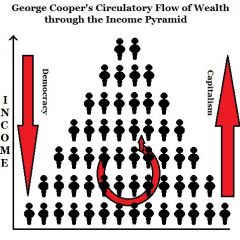Democratic Capitalism is the way forward. Capitalism + empowered democracy is the key to restoring economic fairness throughout the world.
George Cooper
Recently, George Cooper, in his Money, Blood and Revolution (2014), and in his new Fixing Economics (2016), explained that the economic leveling tendency of the twentieth century was a result of the processes inherent in democracy itself. While capitalism is intent on increasing shareholder returns, other forces tend to reduce these returns. Obviously, competition between firms is a contributing factor in this process, but Cooper was able to show that democracy plays a major part.
Whereas capitalism can be expected to improve the wealth of those at the top of the economic pyramid, Cooper argued we should not ignore the fact that, in a democracy, the majority of the people actually have the power to elect those who favor their own cause. For Cooper, this has resulted in taxation being used to redistribute income, most notably seen in the impact of inheritance taxes in England. Other welfare measures meant that those at the bottom part of the pyramid shared in part of the economic prosperity of the nation. Even wage policy can help to share the wealth.
Therefore, on Cooper’s model, capitalism helps to improve the economic value of each person’s labour and effort, and democratic forces ensure that this increased value is spread more fairly between capital and labour.
Trade policies
The relatively fair income distribution of the 20th century has come under direct threat with the beginning of the new millennium. The gap between the rich and the poor has increased in all developed and undeveloped nations, whether they are democratic or not. The old mechanisms are no longer working, and there is little chance that this will change unless there is a change in our economic thinking.
The first thing to accept is that nations are in competition with each other. We do not live in a world which can be realistically governed as if national borders do not exist. They do, and most ordinary people (if not the elites running the show at the moment) want them to continue. Most people value many of the unique aspects of their own national culture and situation. Most people would like the economic situation of their own nation to improve. They are prepared to co-operate in order to achieve that result, and look to their own national government to advance the economic welfare of their own nation. Democratic governments that ignore that imperative do not get re-elected.
The economies of western nations are out of balance, with currently unresolved structural imbalances, and difficult to resolve unemployment issues. These can be fixed, but the first thing is to win the argument against the dominant economic theory, Ricardo’s Comparative Advantage theory. This theory has meant that “tariffs” has become a curse-word. Yet tariffs should be in first line of defences for any national government seeking to advance the economic interests of its own people, particularly when faced with chronic unemployment.
Democratic Capitalism
The economic model of Democratic Capitalism recognizes that capitalism is the engine for economic development. It will deliver economic benefits that neither socialism (of the Sanders and Corbyn type) nor communism (of the Venezuelan and Cuban type) is able to deliver. Yet the 21st century has shown that capitalism needs controls, excised via democratic processes, to ensure that it serves everyone, not just those in control of capital.
It is time that we clearly recognized the two most important economic drivers in a modern economy, Democracy and Capitalism, and stopped toying with dysfunctional alternative models.
